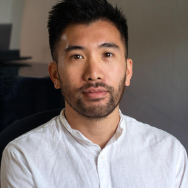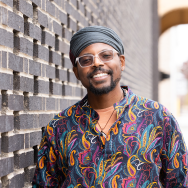Editor’s note: This story is part of ‘Meet a UChicagoan,’ a regular series focusing on the people who make UChicago a distinct intellectual community.
Some people cook elaborate meals in their spare time; others make pottery or grow tomatoes. University of Chicago graduate student Jacob Reed plays the complete organ works of composer Johann Sebastian Bach.
For the past year, if you walked by the University of Chicago’s historic Bond Chapel on Monday afternoons, you likely heard the piping of the Reneker Organ, an instrument Reed likens to a wild, untamable beast.
“The Bond Chapel organ, I don’t think can be domesticated,” said Reed, an organ scholar at UChicago pursuing a Ph.D. in music theory and history. “It's so live and shows so much of what you’re doing. It’s still kind of a high-wire act every time I’m playing it.”
Reed curated the Bach at Bond series, which invited Bach lovers and the organ-curious alike to the chapel for a free weekly concert. From October 2023 to this past May, he performed a total of 30 recitals (about 19 hours)—from Bach’s famous Toccata and Fugue in D minor to arrangements of cuts from obscure cantatas.
“Many accomplished musicians would find it daunting to perform one tenth of what Jacob played, with performances week after week,” said Lawrence Zbikowski, the Addie Clark Harding Professor in the Department of Music and Reed’s dissertation advisor. “Some of these pieces are mind-numbingly difficult.”
The series attracted a loyal following of UChicago community members and music lovers each week to the chapel.
Pat Fuller, MBA’84, attended almost every recital, commuting to Hyde Park from her Evanston home. “His enthusiasm is amazing,” Fuller said. “He's playing the music just for his own pleasure and our pleasure. That, for me, is infectious.”
Bach at Bond
The organ has a bit of a branding problem, according to Reed. He acknowledges that words like “hymn” and “dreary” may cross minds when imagining its sound. But Reed conceived of Bach at Bond in hopes that more people would be drawn to the instrument for the same reasons he was at 14.
Pipe organs are “loud” in every sense of the word. Massive and complex instruments, played with both the hands and feet, organs contain bellows that blow air through hundreds or thousands of pipes, which the organist controls by pulling various “stops” to direct the airflow. Similar to a synthesizer, this creates highly customizable sounds and can even imitate other instruments.
To add another layer of difficulty, no two organs are alike. Even the size and shape of the room can drastically impact the instrument’s sound.
“Pipe organs are installed in buildings, so when you're playing a particular pipe organ, to an extent, you're playing that building,” Zbikowski said.
Reed’s other goal (with lots of help from Rockefeller Memorial Chapel staff) was to give the smaller organ on campus time to shine. In a happy coincidence, Bach at Bond marked the ten-year anniversary of the Reneker Organ’s move and rededication in Bond Chapel. Originally built for what’s now Saieh Hall, the organ was modeled after instruments built in northern Germany in the 17th and 18th centuries—similar to one Bach himself would have played.
The resulting sound, as it resonates around the small, stained glass-filled chapel, is “crystal clear,” according to Ralph Schatz, MBA’76.
“[The Reneker Organ] brought the music to life in a way that a larger organ in a larger space would not have done,” said Schatz, who attended about 20 recitals with his wife Lynne, MBA’73. “The music just surrounds you. It's very easy to be transported to another world.”
On Mondays at 3:30 p.m., Bond Chapel would fill with some “regulars,” but Reed says the large majority of people dropped by out of sheer curiosity.
“That’s what I hoped for, partly because I think Bach’s organ music helps break expectations about what organ music sounds like,” Reed said. “My favorite Bach is basically imitating orchestral music like Vivaldi, or chamber music. It's much more playful.”
Playful is also how some of his fans have described his weekly program notes. In lieu of traditional printed programs, Reed directed audience members to his Substack: Left on Reed (a triple pun).
For every recital, Reed wrote extensive commentaries about each piece, blending musical theory with wry observations. For example, in describing Bach’s F-minor Prelude and Fugue, Reed wrote: “All in all, the piece is a nice combination of harmonic crunchiness, jagged melodic lines, propulsive rhythms, and great dramatic pacing. To risk an analogy: even if you scramble the eggs, you can still make something very tasty out of your attempt at spaghetti carbonara, as long as the ingredients were right.”
Readers also received Reed’s weekly listening recommendations far beyond Bach—from Indigenous singer-songwriters to choral chamber music to K-pop.
“Jacob’s knowledge was so extensive, but there was nothing stuffy in his approach,” said regular attendee Lynne Schatz. “It was really an invitation to learn more, and I thought that was fabulous.”
Reed admits that his organ technique has improved since starting the series, but the real learning moment was fine-tuning his ability to write about music—to pinpoint how and why a piece is good.
He was also pleasantly surprised at the healthy audience the series and blog generated.
“I've definitely gotten comments from people saying: This isn't something I necessarily listen to, but man, that last piece—that was fun,” Reed said. “And that's the best thing I could possibly hope for.”
Music and lyrics
Reed’s mentors and fans describe him as a “polymath”—someone who knows a lot about a lot. In addition to organ, the musician also plays piano, cello, harpsichord and the viola da gamba (a cross between a guitar and a cello). He frequently accompanies choirs or other instrumentalists. He also speaks several languages and has two degrees in organ performance—and is currently writing a dissertation related to none of those things.
Lovers of pop music know that lyrics don’t always make sense. What exactly is “that way” the Backstreet Boys want so much? Why are some words distorted beyond the point of recognition? What is a “Duke of Earl?” It’s this curious relationship between music and language that Reed is most interested in, specifically in English-language pop music.
For his dissertation research, Reed is consulting with linguists to help analyze a wide range of pop music—from the peculiar emphasis of Simon and Garfunkel to the scatting of Ella Fitzgerald. He’s also bringing in theory from Chinese opera, to help support one of his central claims: Genres are tied to ideologies about how music and lyrics go together.
“For instance, singer-songwriters are supposed to have good diction,” Reed said. “In pop songs, that really matters a lot less, especially if they're more beat oriented.”
Though Reed isn’t studying Bach for academic purposes, his fans have no need for fear. For now, he’s continuing the series virtually.
Though no concrete plans currently exist for another organ series next academic year, Reed says: “Expect more.”

